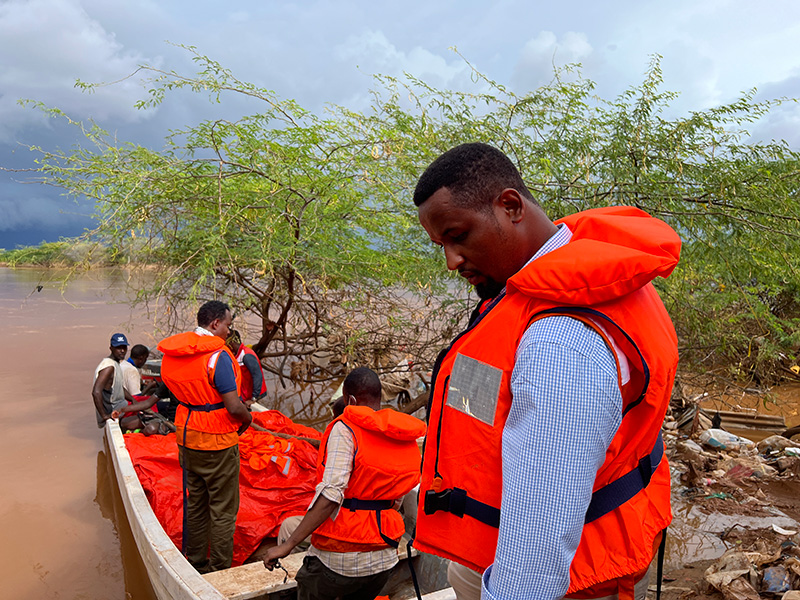Vulnerable Somali children at risk of disease and malnutrition as floods wreak havoc, warns World Vision
Media Contact :
November 20, 2023
Senior Public Relations Manager
[email protected]
m 404-735-0871
Media Contact :
November 20, 2023
Senior Public Relations Manager
[email protected]
m 404-735-0871

MOGADISHU (November 20, 2023) – Global humanitarian organization World Vision is warning that the recent flash floods in Somalia have increased suffering and the risk of disease outbreak for vulnerable children and their families, who had already been devastated by the effects of last year’s prolonged drought.
The floods have destroyed homes, schools, roads and bridges, leaving families without basics such as shelter, food, and clean drinking water. Floodwaters have also contaminated water sources and damaged latrines, increasing the risk of disease outbreaks such as cholera and diarrhea that can lead to malnutrition, especially for vulnerable children.
Government and humanitarian partners estimate that the floods in Somalia have killed at least 30 people, among them children; displaced approximately 650,000 people; and severely affected 1.7 million people, far exceeding planning and preparedness estimates. The Somalia government has declared a state of emergency and the U.N. has termed the ongoing floods, which have been particularly severe in the southern part of the country, a “once-in-a-century” event.
“Ongoing flooding has destroyed homes, forcing children and their families to leave their homes, [with] some of [them] now sheltering in makeshift structures in the open. As they move, they are at increased risk of illness,” said Kevin Mackey, country director for World Vision in Somalia.
“Crocodiles, too, have infested the water and farmers don’t dare to wade in to pick fruit off the trees. … roads and homes have turned into rivers and many are anxious about the rising floodwaters and how much more destruction [they] will bring,” Mackey noted, adding that the destructive cycle of drought and floods are disproportionately impacting poor and conflict-affected countries.
“Last month, I met Aden Mohammed, a farmer in a district called Luuq, situated in the Gedo region. The floods completely destroyed their farm with all the watermelon, maize and fruit trees he had planted. The water pump, too, was submerged in water. Aden now needs support to feed his children, and he will have to start all over again … as will most families impacted by these floods,” Mackey said.
Mohamed Hassan, a community faith leader in a district that’s witnessed the worst of the floods, pleaded for urgent support after he witnessed the floods’ destructive power.
“The river, which is infested with crocodiles, has moved to where we used to [live], but the children want to play in the water. They don’t know how dangerous it is,” he said.
World Vision says that months of heavy rains experienced not only in Somalia, but also in neighbouring Ethiopia and Kenya, have raised water levels in the two main rivers in Somalia, Shabelle and Juba, breaking the banks and causing massive flooding. Settlements have experienced flash flooding, and farms and fields are saturated with water.
The floods have collapsed bridges and flooded and worsened conditions on local roads, making movement and access increasingly difficult. With roads blocked, land transporters are unable to bring in food supplies. Main supply routes from neighboring countries and cities including the capital, Mogadishu, have been cut off, and markets have been disrupted, causing fears of food shortages.
Both road and air transport interruption have made the delivery of emergency response supplies extremely challenging. World Vision along with partners and the local authorities have been supporting evacuation efforts, helping families relocate to higher ground.
In anticipation of the massive flooding, World Vision had also pre-positioned emergency supplies in locations identified as hotspots.
“We had stockpiled nutrient-rich food, mosquito nets and water purifiers. That has enabled a rapid initial response. However, with the floodwaters rising daily, major supply roads cut off and air service unpredictable, the humanitarian needs continue to grow as these essential supplies dwindle,” said Mackey.
About World Vision:
World Vision is a Christian humanitarian organization conducting relief, development, and advocacy activities in its work with children, families, and their communities in nearly 100 countries to help them reach their full potential by tackling the causes of poverty and injustice. World Vision serves all people regardless of religion, race, ethnicity, or gender. For more information, please visit www.WorldVision.org/media-center/ or on Twitter @WorldVisionUSA.